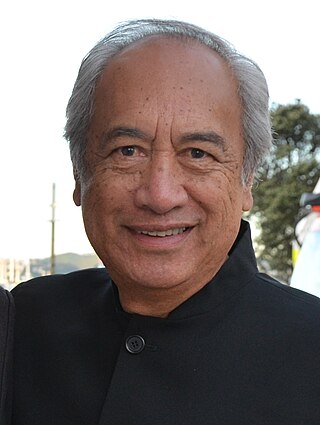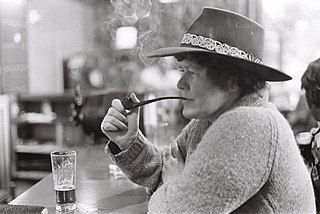
New Zealand literature is literature, both oral and written, produced by the people of New Zealand. It often deals with New Zealand themes, people or places, is written predominantly in New Zealand English, and features Māori culture and the use of the Māori language. Before the arrival and settlement of Europeans in New Zealand in the 19th century, Māori culture had a strong oral tradition. Early European settlers wrote about their experiences travelling and exploring New Zealand. The concept of a "New Zealand literature", as distinct from English literature, did not originate until the 20th century, when authors began exploring themes of landscape, isolation, and the emerging New Zealand national identity. Māori writers became more prominent in the latter half of the 20th century, and Māori language and culture have become an increasingly important part of New Zealand literature.

Maurice Gough Gee is a New Zealand novelist. He is one of New Zealand's most distinguished and prolific authors, having written over thirty novels for adults and children, and has won numerous awards both in New Zealand and overseas, including multiple top prizes at the New Zealand Book Awards, the James Tait Black Memorial Prize in the UK, the Katherine Mansfield Menton Fellowship, the Robert Burns Fellowship and a Prime Minister's Award for Literary Achievement. In 2003 he was recognised as one of New Zealand's greatest living artists across all disciplines by the Arts Foundation of New Zealand, which presented him with an Icon Award.

Witi Tame Ihimaera-Smiler is a New Zealand author. Raised in the small town of Waituhi, he decided to become a writer as a teenager after being convinced that Māori people were ignored or mischaracterised in literature. He was the first Māori writer to publish a collection of short stories, with Pounamu, Pounamu (1972), and the first to publish a novel, with Tangi (1973). After his early works, he took a ten-year break from writing, during which he focused on editing an anthology of Māori writing in English.

Michael King was a New Zealand historian, author, and biographer. He wrote or edited over 30 books on New Zealand topics, including the best-selling Penguin History of New Zealand, which was the most popular New Zealand book of 2004.

Keri Ann Ruhi Hulme was a New Zealand novelist, poet and short-story writer. She also wrote under the pen name Kai Tainui. Her novel The Bone People won the Booker Prize in 1985; she was the first New Zealander to win the award, and also the first writer to win the prize for a debut novel. Hulme's writing explores themes of isolation, postcolonial and multicultural identity, and Maori, Celtic, and Norse mythology.
The Ockham New Zealand Book Awards are literary awards presented annually in New Zealand. The awards began in 1996 as the merger of two literary awards events: the New Zealand Book Awards, which ran from 1976 to 1995, and the Goodman Fielder Wattie Book Awards, which ran from 1968 to 1995.

Alan Duff is a New Zealand novelist and newspaper columnist. He is best known as the author of the novel Once Were Warriors (1990), which was made into a film of the same name in 1994.

Jacqueline Cecilia Sturm was a New Zealand poet, short story writer and librarian. She was one of the first Māori women to complete an undergraduate university degree, at Victoria University College, followed by a Masters of Arts in Philosophy. She was also the first Māori writer to have her work published in an English anthology. Her short stories were published in several collections and student magazines in the 1950s and early 1960s, and in 1983 a women's publishing collective printed a collection of her short stories as The House of the Talking Cat. She continued to write short stories and poetry well into the early 2000s, and is regarded today as a pioneer of New Zealand literature.

Dame Fiona Judith Kidman is a New Zealand novelist, poet, scriptwriter and short story writer. She grew up in Northland, and worked as a librarian and a freelance journalist early in her career. She began writing novels in the late 1970s, with her works often featuring young women subverting society's expectations, inspired by her involvement in the women's liberation movement. Her first novel, A Breed of Women (1979), caused controversy for this reason but became a bestseller in New Zealand. Over the course of her career, Kidman has written eleven novels, seven short-story collections, two volumes of her memoirs and six collections of poetry. Her works explore women's lives and issues of social justice, and often feature historical settings.

Briar Grace-Smith is a screenwriter, director, actor, and short story writer from New Zealand. She has worked as an actor and writer with the Maori theatre cooperative Te Ohu Whakaari and Maori theatre company He Ara Hou. Early plays Don't Call Me Bro and Flat Out Brown, were first performed at the Taki Rua Theatre in Wellington in 1996. Waitapu, a play written by Grace-Smith, was devised by He Ara Hou and performed by the group on the Native Earth Performing Arts tour in Canada in 1996.

Renée Gertrude Taylor, known professionally as Renée, was a New Zealand feminist writer, playwright, novelist and short story writer. She started writing plays in her 50s, with her first play, Setting the Table, written in 1981, and with her most well-known works being the trilogy of plays beginning with Wednesday to Come (1984). Renée described herself as a "lesbian feminist with socialist working-class ideals", and her plays feature strong female characters who are often working class.
Arapera Hineira Blank was a New Zealand poet, short-story writer and teacher. She wrote in both te reo Māori and English, and was one of the first Māori writers to be published in English. Her work focussed on aspects of Māori life and the life of women. In 1959 she was awarded a special Katherine Mansfield Memorial Award for a bilingual essay. In 1986 she published a collection of poetry, and after her death her son published a further collection of her writing in 2015.
Robyn Kahukiwa is an Australian-born New Zealand artist, award-winning children's book author, and illustrator. Kahukiwa has created a significant collection of paintings, books, prints, drawings, and sculptures.
Kelly Ana Morey is a novelist and poet from New Zealand.
Melinda Szymanik, born 1963, is an author from New Zealand. She writes picture books, short stories and novels for children and young adults and lives in Auckland, New Zealand.

Whiti Hereaka is a New Zealand playwright, novelist and screenwriter and a barrister and solicitor. She has held a number of writing residencies and appeared at literary festivals in New Zealand and overseas, and several of her books and plays have been shortlisted for or won awards. In 2022 her book Kurangaituku won the prize for fiction at the Ockham New Zealand Book Awards and Bugs won an Honour Award in the 2014 New Zealand Post Awards for Children and Young Adults. She lives in Wellington, New Zealand.
Roma Potiki is a New Zealand poet, playwright, visual artist, curator, theatre actor and director, as well as a commentator on Māori theatre. She is of Te Rarawa, Te Aupōuri and Ngāti Rangitihi descent. As well as being a published poet, her work is included in the permanent collection of the Dowse Art Museum.
Margaret Rose Orbell was a New Zealand author, editor and academic. She was an associate professor of Māori at the University of Canterbury from 1976 to 1994. During her career, Orbell wrote several books on Māori literature and culture, edited numerous collections of songs, poetry and stories, and brought Māori works to a wider and international audience. She was an editor of bilingual magazine Te Ao Hou / The New World in the 1960s, and expanded the magazine's literary and historical content. In 2002, she was appointed a Companion of the New Zealand Order of Merit, for services to Māori and literature.
Ariana Rahera Tikao is a New Zealand singer, musician and author. Her works explore her identity as a Kāi Tahu woman and her music often utilises taonga pūoro. Notably, she co-composed the first concerto for taonga pūoro in 2015. She has released three solo albums and collaborated with a number of other musicians. She was a recipient of an Arts Foundation Laureate Award in 2020.

Potiki is a novel by New Zealand author Patricia Grace. First published in 1986, the book is a significant work in contemporary Māori literature, and explores themes of cultural identity, land rights, and the impacts of urban development on indigenous communities. It was critically and commercially successful, and received the New Zealand Book Award for Fiction in 1987. It was published during the Māori renaissance, a period of time in which Māori culture and language was experiencing a revitalisation, and academics have described it as being part of that movement.













